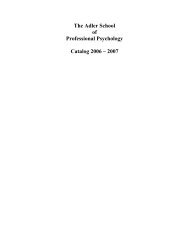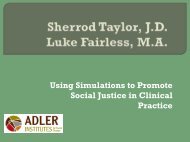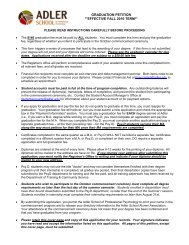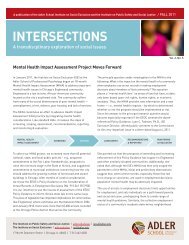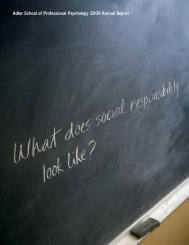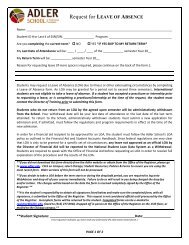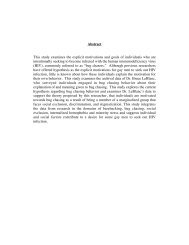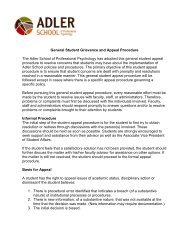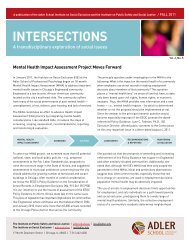Spring 2008 - Adler School of Professional Psychology
Spring 2008 - Adler School of Professional Psychology
Spring 2008 - Adler School of Professional Psychology
You also want an ePaper? Increase the reach of your titles
YUMPU automatically turns print PDFs into web optimized ePapers that Google loves.
ecological literature placing the addicted self<br />
within the cultural fabric; a psychoanalyticallyoriented<br />
literature exploring etiology; and a<br />
political/philosophical literature that questions the<br />
nature and view <strong>of</strong> the self needing restoration.<br />
Virtually all <strong>of</strong> this literature speaks to the ways in<br />
which subjective experiences <strong>of</strong> addiction and<br />
structural factors interrelate. For example, one<br />
seminal work, anthropologist and participantobservor<br />
Phillipe Bourgois’ “In Search <strong>of</strong> Respect:<br />
Selling Crack in El Barrio” (1995), reveals a culture<br />
in which a changing global economy and limited<br />
employment options restrict jobs for minimallyeducated<br />
Puerto Rican males living in New York<br />
City’s East Harlem. Their situation prevents them<br />
from living out culturally-dictated “machoproletarian<br />
dreams—[so that] they find<br />
themselves propelled headlong into an explosive<br />
confrontation between their sense <strong>of</strong> cultural<br />
dignity versus the humiliating interpersonal<br />
subordination <strong>of</strong> service work.” (Bourgois, 1995.)<br />
Without the pr<strong>of</strong>essional capabilities, social skills,<br />
knowledge <strong>of</strong> dress codes or mores requisite to<br />
the <strong>of</strong>fice culture <strong>of</strong> the service economy to which<br />
they are relegated, these men find that their<br />
“oppositional street identity is dysfunctional….<br />
Street culture is in direct contradiction to the<br />
humble, obedient modes <strong>of</strong> subservient social<br />
interaction that are essential for upward mobility<br />
in high-rise <strong>of</strong>fice jobs.” (Bourgois, 1995.) In this<br />
situation, drug dealing, with attendant use,<br />
becomes an alternative career path, a route to<br />
maintaining one’s dignity as well as earning a living.<br />
The author interprets:<br />
“[D]rugs are not the root <strong>of</strong> the problems…;<br />
they are the epiphenomenal expression <strong>of</strong><br />
deeper, structural dilemmas. Self-destructive<br />
addiction is merely the medium for<br />
desperate people to internalize their<br />
frustration, resistance and powerlessness….<br />
The problem <strong>of</strong> substance abuse in the<br />
United States is… because <strong>of</strong> a polarization<br />
<strong>of</strong> the structural roots that generate selfdestructive<br />
behavior and criminal activity.<br />
The economic base <strong>of</strong> the traditional working<br />
class has eroded…. Greater proportions<br />
<strong>of</strong> the population are being socially<br />
marginalized. The restructuring <strong>of</strong> the world<br />
economy,… as well as the exhaustion <strong>of</strong><br />
social democratic models for public sector<br />
intervention on behalf <strong>of</strong> the poor, have<br />
escalated inequalities around class, ethnicity<br />
and gender.” (Bourgois, 1995.)<br />
In advocating for a reduction in the “economic<br />
dynamism” <strong>of</strong> the drug economy and<br />
transformation <strong>of</strong> the “fragility and hostility” <strong>of</strong> the<br />
legal entry-level labor market, Bourgois (1995)<br />
states: “The alternative, <strong>of</strong> course, is to lock<br />
everyone up.”<br />
This way <strong>of</strong> looking at addiction resonates with<br />
that <strong>of</strong> policymakers in countries outside the U.S.<br />
that have embraced SE thinking. It implies that<br />
appropriate social responses to the “drug<br />
problem” increase social inclusion when addiction<br />
is coincident with exclusion, so that repair <strong>of</strong> the<br />
addicted self involves incorporation into social<br />
participation and belonging. British models <strong>of</strong><br />
“joined up” programs to address addiction<br />
exemplify this philosophy well and use a language<br />
that emphasizes concepts <strong>of</strong> self, meaning,<br />
belonging and social capital. The assumption that,<br />
as suggested by the experimental studies on SE<br />
mentioned, belonging is a fundamental human<br />
need is integral to them. In turn, inclusion or<br />
belonging depends on “feeling useful, having a<br />
role and being treated with respect” thoughtout<br />
the life cycle. (Bonner, 2006.) One is then able to<br />
construct a coherent narrative, linking the self to<br />
society at large—i.e., to achieve meaning. Thus, in<br />
responsible societies,<br />
“… a wide range <strong>of</strong> physiological and<br />
psychological factors contribute to effective<br />
individual functioning, a prerequisite to<br />
belonging to a community. Clearly these<br />
biopsychological factors interact with a<br />
plethora <strong>of</strong> social and community factors<br />
that facilitate inclusion into society. For many<br />
vulnerable people, their living conditions,<br />
educational opportunities, employment<br />
prospects and involvement in the<br />
community mitigate against inclusion. In a<br />
civil society, an appropriate community<br />
response would involve an awareness <strong>of</strong> the<br />
needs <strong>of</strong> its members, and a response would<br />
provide appropriate support…”(Bonner, 2006.)<br />
Under this model, cessation <strong>of</strong> addictive behavior<br />
and associated criminal or antisocial behaviors<br />
alone (i.e., social control) would be viewed as an<br />
incomplete outcome for an excluded individual<br />
treated for addiction. Treatment programs would<br />
have to be integrated with other social services<br />
addressing and resolving the factors that exclude<br />
the individual and would need to reflect the ethic<br />
<strong>of</strong> social capital formation; moreover, at a metalevel,<br />
programs would also need to confront the<br />
social factors driving exclusion.<br />
Several writers argue that, historically, drug policy<br />
in the U.S. reflects a wrenching tension between<br />
the conflicting values <strong>of</strong> personal responsibility<br />
and communal obligation. Many, including this<br />
writer, would assert that late 20th century/early<br />
21st century policies in the U.S. tip almost<br />
exclusively to the side <strong>of</strong> individual responsibility<br />
(incarcerate and blame the addict) with<br />
insufficient public resources devoted to<br />
rehabilitation, much less social integration. Two<br />
researchers summarize:<br />
“… [H]ealth psychologists…[and other social<br />
scientists] have directed their attention to<br />
‘downstream’ mechanisms through which<br />
social experiences ‘get under the skin’ and<br />
create disparities in physical and mental<br />
health… [They have emphasized] the role <strong>of</strong><br />
[individual] psychosocial factors,… particularly<br />
stress, coping, health behaviors and their<br />
physiological correlates, … with little attention<br />
given to their [upstream and] structural<br />
origins … (Schnittker and McLeod, 2005.)<br />
Social exclusion policy addresses this imbalance,<br />
however, in that it <strong>of</strong>fers a framework for<br />
understanding addictive behavior as one response<br />
to structural social disadvantage. Addiction then<br />
becomes both a cause and a result <strong>of</strong> SE.<br />
References<br />
Baumeister, Roy F. (2005). Social exclusion<br />
impairs self-regulation. Journal <strong>of</strong> Personality<br />
and Social <strong>Psychology</strong>, 88, 589-604.<br />
Bonner, Adrian. (2006). Social exclusion and the<br />
way out: An individual and community response<br />
to human social dysfunction. Chichester, West<br />
Sussex, England: John Wiley & Sons, Ltd.<br />
Bourgois, Philippe. (1995). In search <strong>of</strong> respect:<br />
Selling crack in El Barrio. NewYork: Cambridge<br />
University Press.<br />
Denzin, Norman K. (1993). The alcoholic society:<br />
Addiction and recovery <strong>of</strong> the self. New<br />
Brunswick: Transaction Publishers.<br />
do Amaral Madureira, Ana Flavia. (2007).<br />
The self-control ethos as a mechanism <strong>of</strong><br />
social exclusion in western societies.<br />
Culture & <strong>Psychology</strong> 13, 419-430.<br />
Durrant, Russil and Thakker, Jo. (2003).<br />
Substance use and abuse: Cultural and historical<br />
perspectives. Thousand Oaks: Sage Publications.<br />
MacDonald, Ge<strong>of</strong>f and Leary, Mark R. (2005).<br />
Why does social exclusion hurt The relationship<br />
between social and physical pain. Psychological<br />
Bulletin 131, 202-223.<br />
Schnittker, Jason and McLeod, Jane D. (2005).<br />
The social psychology <strong>of</strong> health disparities.<br />
Annual Review <strong>of</strong> Sociology 31, 75-103.<br />
Substance Abuse and Mental Health Services<br />
Administration. (2001). Summary <strong>of</strong> findings<br />
from the 2000 national household survey on<br />
drug abuse (DHHS Publication No. SMA01-3549).<br />
Rockville: Office <strong>of</strong> Applied Studies, NHDSA<br />
Series H-13.<br />
Todman, Lynn C. (<strong>2008</strong>). Welcome to a new<br />
conversation. Intersections: A Trans-Disciplinary<br />
Exploration <strong>of</strong> Social Exclusion 1, 1.<br />
Twenge, Jean M. (2003). Social exclusion and<br />
the deconstructed state: Time perception<br />
meaninglessness, lethargy, lack <strong>of</strong> emotion and<br />
self-awareness. Journal <strong>of</strong> Personality and Social<br />
<strong>Psychology</strong> 85, 409-423.<br />
Twenge, Jean M.; Catanese, Kathleen R.; and<br />
Baumeister, Roy. (2002). Social exclusion and<br />
causes <strong>of</strong> self-defeating behavior. Journal <strong>of</strong><br />
Personality and Social <strong>Psychology</strong> 83, 606-615.<br />
Wallace, John M., Jr. (1999). The social ecology<br />
<strong>of</strong> addiction: Race, risk and resilience. Pediatrics<br />
103, 1122-1127.



